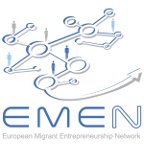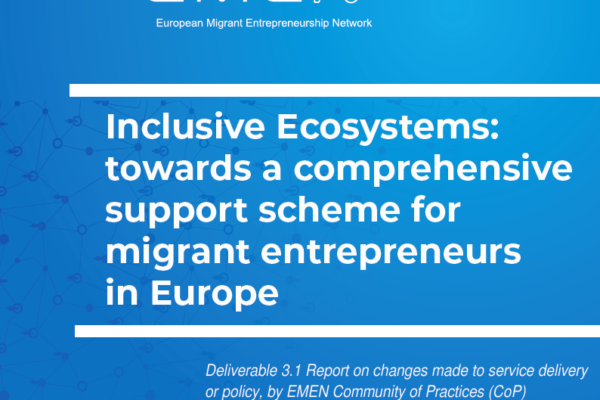The Discussion note on access to finance for migrant entrepreneurs written by the CoP 2 – Access to Finance leader, The Hague University of Applied Sciences, has been released! Click below to get it!
DownloadMigrant and refugee entrepreneurs meet many useful people on their journeys towards a better life, and not just when they are writing or finalizing a business plan. It already begins when they are contemplating leaving their countries, and such encounters continue throughout. Enterprising individuals are always seeking contacts or meeting other people who will advise them, are willing to converse, may be available to counsel them, who will act as a coach or mentor, who can refer them to others, can share information and insights, or who may decide (or not) to invest in their new venture.
There is a broad spectrum of stakeholders, direct and indirect contacts, for prospective and existing refugee or migrant entrepreneurs. Stakeholders whose roles and work will be effective when they understand the context in which the refugee or migrant entrepreneur operates and lives, and when they understand the varying financing needs during these journeys. When they understand this context, stakeholders will also be effective in creating access to finance, to the great number of financing possibilities and options – both traditional and emerging, innovative ones. Creating access to appropriate financing is more than just helping to write a business plan and related financing plans. To create real access to finance, all stakeholders including the entrepreneur him/herself need to be well informed and understand the specific financing needs for the different stages of the journey that the migrant or refugee takes. That is not one single financing solution; the options are manifold. Good matching is therefore key.
This note will be helpful in understanding the varying financing needs that migrant/refugee entrepreneurs have over time.
The note:
- Presents a way of looking at the micro, small and medium enterprise (MSME) universe;
- Describes the various stages of migration and relates this to business development;
- Goes deeper into the financing needs along the business life cycle, especially for migrant/refugee entrepreneurs;
- Discusses the many financing possibilities that exist for migrant/refugee entrepreneurs;
- Comes with suggestions of which elements must be taken into account by public authorities, trainers, coaches, mentors and staff at financial institutions to ensure that migrant/refugee entrepreneurs have realistic access to (an ever more diverse) financing.
The note contains suggestions for modifying training programmes for entrepreneurs if these are offered to migrant/refugee entrepreneurs, as well as suggestions on the elements or issues that should be included in information packages for staff of support organisations (financial intermediaries and business support organisations) and for social welfare staff and public authorities to better serve migrant and refugee entrepreneurs. In the annexes, examples of interesting initiatives are given as well as a list of good practices in business development programmes, training, and pre- and post-loan consultancy services leading to improved understanding and use of financing.
This note has been written by a team of specialists from The Hague University of Applied Sciences (THUAS), the lead partner of the Community of Practice 2, Access to Finance for migrant/refugee entrepreneurs (CoP2) of the European Migrant Entrepreneurship Network (EMEN) project. The content is based on the outcome of research, literature studies, a special survey carried out in 2018/2019 by THUAS, working papers prepared earlier2, debates and discussions during the 2nd International EMEN event held in 2019 (The Hague, 20th June 2019) and interviews with key resource people.
By Klaas Molenaar.



